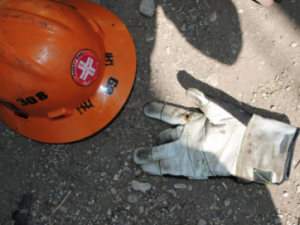Worker fatalities and corresponding governmental failures were detailed recently in “Fatal Flaws: How Kentucky is Failing Its Workers,” an online series produced by the Kentucky Center for Investigative Reporting (KCIR). The thorough exposé described the complex legal and political factors involved in our system intended to protect employees from harm through governmental regulation. The Commonwealth’s agency responsible for this task is the Kentucky Occupational Safety and Health Program (KyOSH), with the Labor Cabinet.
Whether by design or indifference, mismanagement has greatly diminished the agency’s quality of human capital. Human resources policies have not been used to attract and retain high-quality personnel. Want to cripple a regulatory agency? Starve it of capable individuals.

Photo from KYCIR
Leadership should know that even B-grade safety professionals won’t apply for a job to become a KyOSH inspector with starting salary of $31,071. The National Safety Council’s 2018 salary survey for safety and health professionals reports that for the east south central region (AL, KY, MS, TN), almost 40% of salaries range from $60,000-$79,999. At the lowest end, only 2% reported making less than $40,000. One could speculate that they all work for KyOSH.
My students typically get hired into occupational safety jobs ranging from $40 to $60,000/year. Can I recommend to my students a career with KyOSH? Not with such low salaries, coupled with that fact that the average student now is graduating with around $27,000 in student loan debt. He or she can’t afford to work for KyOSH.
The KJIC reported that 25% of inspectors have less than 1-year experience, while 63% have three years or less. It is unrealistic to expect such junior employees to perform these tasks, and irresponsible of KyOSH administrators to expect them without proper preparation. I know several new hires at KyOSH who soon realized that along with their meager salaries, there were no incentives in place to encourage them to stay. KyOSH employees have received no increases in annual salary since 2016, according to the Legislative Research Commission, with no improvements on the horizon. Few employees will stay in a job where there is no projected increase in salary.
The problems illuminated by the KCIR investigation are numerous and complex. It is my sincere hope that improvements will come soon. Kentucky’s workers are an asset that must be safeguarded in order for the state to progress economically. At a deeper level, there exists the moral duty to protect workers from harm. Administrators have not taken the steps necessary to retain employees, precluding any opportunity for the development of knowledge, skills, and abilities. KyOSH’s overall performance is inextricably limited to individuals’ capabilities.
Those responsible for KyOSH must first admit that the agency has dire performance problems. (A condition of administrative denial is evident in the agency’s response to OSHA’s audit.) Leadership must then apply management practices which are based on the understanding that personnel are integral to organization efficacy. Human resources policies must include competitive wages, incentive pay to spur high performance, high task flexibility, and similar provisions. In short, run KyOSH like a business that you want to succeed.
Dr. David Stumbo is an Assistant Professor with Eastern Kentucky University’s Department of Safety and Security. He worked for KyOSH from 1996-2017 as Safety Program Manager, Health Standards Specialist, Compliance Officer, and other classified positions.

















It’s a shame that the Kentucky Occupational Safety and Health Program has fallen into disrepair and sunk so low. Twenty years ago Kentucky had the best State Plan State in the nation. Sad to see it now.